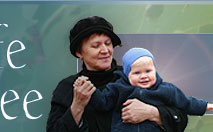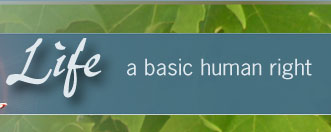|

North Carolina advance directives bill is not pro-life
Proposed bill will produce complicated, confusing advance directives. Provides no protection against withholding ordinary care. Opens door to guardianship disputes.
Feast of the Good Shepherd
April 29, 2007
Dear all,
A bill has been introduced into the North Carolina legislature which deserves your immediate attention. S1046, titled “Advance Directives/Health Care Pwr. Atty,” greatly expands the scope of advance directive law in North Carolina.[PDF version at NC General Assembly site.] For those who might not know, advance directives are written statements made in advance of need regarding preferences for medical care. The two types are the "living will" and health care power of attorney.
The “living will” was developed by the Euthanasia Society of America in 1967. It became the cornerstone of the so called right-to-die movement. See LifeTree’s timeline for a history of the movement.
The Catholic Church teaches that, although truly extraordinary medical treatment may be refused, there is an obligation to provide ordinary care, and that nutrition and hydration are in almost all cases considered ordinary care. The "living will" requires prediction of the future that is not possible. In addition, this particular form is so complex that it makes it impossible to know what directions one is providing for the future. For this reason, the “living will” violates the teachings of the Catholic Church.
S1046 is a broadly drafted bill and proposes to change the entire scope and framework of advance directive law in North Carolina. There are many dangerous elements. In a later email I will discuss the MOST form which is in pilot studies in NC but which will become part of the NC statutes if this bill passes. Think of MOST as “doctor’s orders” without a required doctor’s signature or patient’s signature. There goes the doctor-patient relationship. (See also our June, 2006, newsletter.)
The bill, if enacted, will change the “triggering conditions” that put into effect a “Declaration of a Desire for Natural Death” or “living will” in North Carolina. The proponents of this bill argue wrongly that this bill clarifies and simplifies North Carolina's current statutes.
Under present law, your medical condition has to be determined by two physicians to be “terminal and incurable,” or you must be diagnosed as in a “persistent vegetative state” for a “living will” to become effective. The proposed statute will require only one physician’s determination of “incapacity” and will broaden the language to
- an “incurable or irreversible condition” that will result in death within a relatively short period of time, or
- being “unconscious” and to a “high degree of medical certainty will never regain consciousness” and
- adds new the condition “suffers from advanced dementia or any other condition resulting in the substantial loss of cognitive ability …(which) to a high degree of medical certainty is not reversible."
This prominent display of dementia in the “living will” breaks dangerous new ground. The bill would permit any person to say that if and when a physician determines that the patient “suffers from advanced dementia or other loss of cognitive ability”, they are not to be given “life prolonging measures” which include food and water. Although the patient's death is not imminent, the advance directive leaves open the door for hastening death.
A year before he died, John Paul II addressed participants at an International Congress on Life Sustaining Treatments. His statement has bearing on the morality of "living wills."
"I should like particularly to underline how the administration of water and food, even when provided by artificial means, always represents a natural means of preserving life, not a medical act. Its use, furthermore, should be considered, in principle, ordinary and proportionate, and as such morally obligatory, insofar as and until it is seen to have attained its proper finality, which in the present case consists in providing nourishment to the patient and alleviation of his suffering.
The obligation to provide the "normal care due to the sick in such cases" (Congregation for the Doctrine of the Faith, Iura et Bona, p. IV) includes, in fact, the use of nutrition and hydration (cf. Pontifical Council "Cor Unum", Dans le Cadre, 2, 4, 4; Pontifical Council for Pastoral Assistance to Health Care Workers, Charter of Health Care Workers, n. 120). The evaluation of probabilities, founded on waning hopes for recovery when the vegetative state is prolonged beyond a year, cannot ethically justify the cessation or interruption of minimal care for the patient, including nutrition and hydration. Death by starvation or dehydration is, in fact, the only possible outcome as a result of their withdrawal. In this sense it ends up becoming, if done knowingly and willingly, true and proper euthanasia by omission."
Address of John Paul II to the Participants in the International Congress on "Life-Sustaining Treatments and Vegetative State: Scientific Advances and Ethical Dilemmas, Saturday, 20, March 2004.
Proponents of this legislation argue that it only authorizes and facilitates the right of individuals to exercise autonomy over their lives and bodies. But the Church teaches that there are limits to one's rights and that autonomy must be exercised within right conscience.
Herein is a “right to die with dignity” that is moving our society towards a “duty to die” when one becomes unproductive.
My pastor wrote in the parish newsletter recently introducing his flock to a Defender of the Sanctity of Life, Blessed Clemens August von Galen, who was Bishop of Munster during the time of the Third Reich in Germany. He quoted from a sermon by the cardinal given August 3, 1941 denouncing the “termination” of the lives of so many of the mentally ill. “These are men and women, our neighbors, our brothers and sisters! Poor ill human beings. Maybe they are unproductive,…but does that mean that they have lost the right to live?...If one adopts and puts into practice the principle that men are entitled to kill their unproductive fellows, then woe to all of us when we become aged and inform!...”
The bill is sponsored by Sen. Fletcher Hartsell, an attorney, and cosponsors Sens. Forrester (physician), Purcell (physician) and Soles (attorney). It is before the Senate Judiciary II Committee of the North Carolina Senate.
Two attorneys who helped draft the bill and a doctor who uses the MOST form in Western North Carolina spoke on the bill last Thursday. Although we were told the hearing would be open to other comments it was not. No vote was taken.
The bill will be heard again and probably voted on by the Senate Judiciary II Committee next Tuesday, May 1st. It must be acted on in the full NC Senate by the Crossover Date which is May 17th.
Please call the members of the Senate Judiciary II Committee listed at the link above and express your views. They are in their home districts until late Monday afternoon but their office will probably answer during the day on Monday. The committee meets Tuesday at 10am. We will report back the results of that meeting. There will be other deadlines on this important bill. Please express your opposition.
Thank you.
God bless you.
Elizabeth (Betty) D. Wickham, PhD
Executive Director, LifeTree
www.lifetree.org
PO Box 19301
Raleigh, NC, 27619
919-785-0855
Copyright, © April, 2007
Dr. Elizabeth D. Wickham
|







